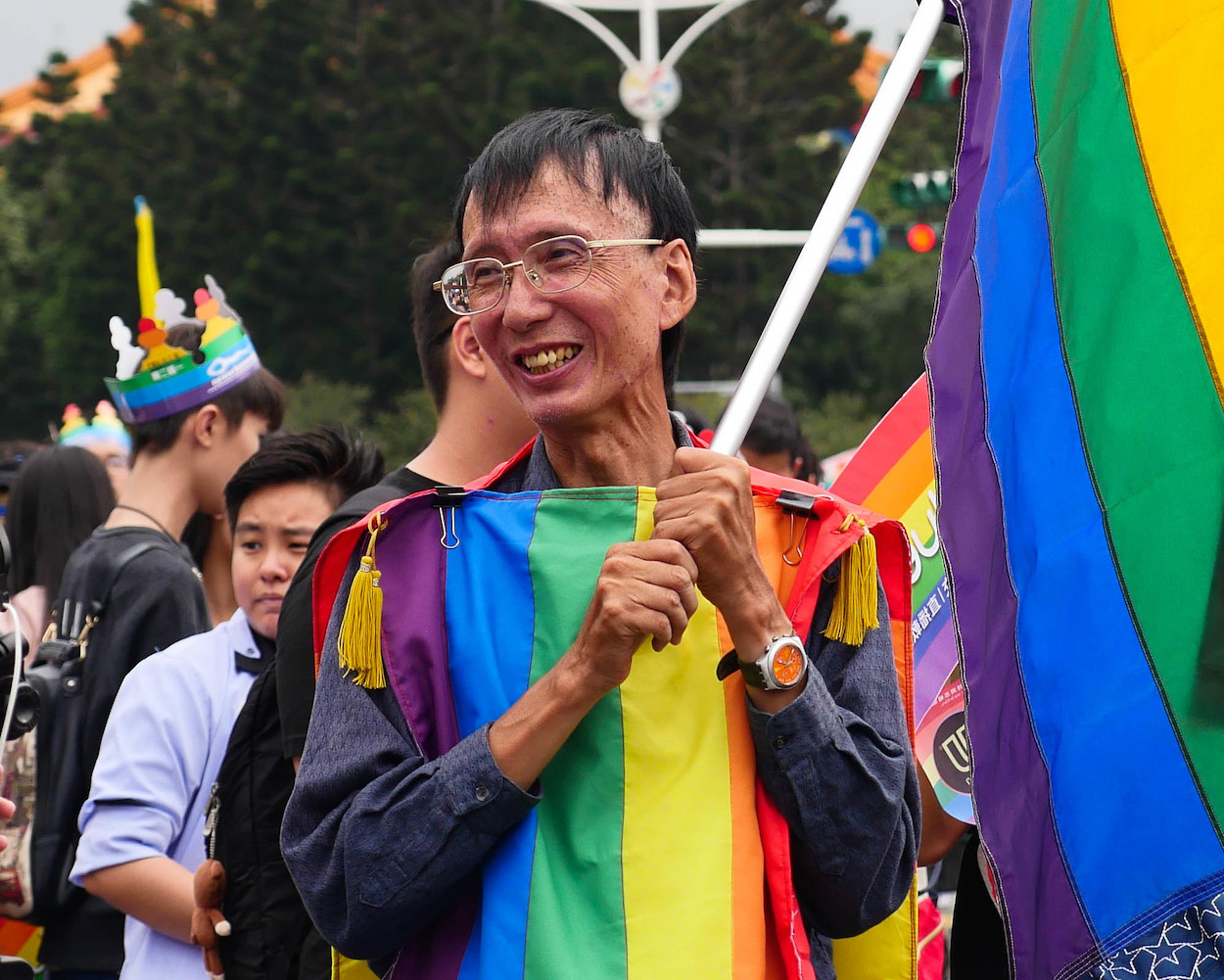by Brian Hioe
語言:
English
Photo Credit: Brian Hioe
WITH THE ONE year anniversary of Taiwan’s legalization of gay marriage coming up later this month, the Taiwan Alliance to Promote Civil Partnership Rights (TAPCPR) has announced a campaign aimed at broadening the scope of transnational gay marriages in Taiwan.
The bill to legalize gay marriage cleared its third reading on May 17th, 2019, with gay marriage becoming legal on May 24th. However, there were some gaps in the scope of the bill. If a Taiwanese person wishes to marry a foreigner of the same sex, that foreigner must be from a country that has also legalized gay marriage. Likewise, foreign same-sex couples are not able to get married in Taiwan if one of them is from a country that has not legalized gay marriage. To this extent, same-sex couples who both come from countries that have not legalized gay marriage cannot get married in Taiwan.
 Chi Chia-wei. Photo credit: KOKUYO/WikiCommons/CC
Chi Chia-wei. Photo credit: KOKUYO/WikiCommons/CC
The TAPCPR is the organization that filed the lawsuit which led to the Taiwanese Constitutional Court ruling in 2017 that forbidding same-sex unions was unconstitutional. The TAPCPR filed the lawsuit on behalf of longtime marriage equality activist Chi Chia-wei. The Constitutional Court mandated that same form of same-sex marriage legislation would have to be passed into law by the legislature within two years, or same-sex marriage would automatically become law.
The form of gay marriage passed by the legislature did not fully meet the expectations of the TAPCPR and other organizations which were advocating for marriage equality. Not only were transnational marriages limited to individuals from countries that had both legalized gay marriage, but couples were only allowed to adopt children who are the biological children of one of the couple.
Though Chi Chia-wei actually attempted to force the issue immediately after same-sex marriage was passed into law and the lacking aspects of the law were brought up by marriage equality groups after it passed into law, there was no immediate campaign to amend the bill after it was passed. But presently, marriage equality groups including the TAPCPR and the Taiwan Tongzhi Hotline, Taiwan’s oldest LGBTQ organization, are hoping to leverage on momentum from the one anniversary of gay marriage being legalized, as it would be unlikely that there would be any political willpower from the DPP to make further amendments to the bill immediately after it was signed to law.
An online petition calling for the expansion of the scope of transnational gay marriages in Taiwan was announced on April 1st, gaining over 10,000 signatures. In the coming month, the TAPCPR plans to campaign for signatures across Taiwan in cities and counties including Taipei, Hsinchu, Miaoli, Chiayi, Kaohsiung, and Hualien.
A fundraising campaign by the TAPCPR announced last week gained 2.8 million NT from 1,600 donors, with a fundraising goal of 4 million NT. The overall name of the campaign to push for transnational marriages is “SEA You Soon” (飄洋過海來看你). A music video released on the first day of the campaign has accumulated over two million views.
Notably, the music video was in itself a transnational collaboration, seeing as the song was a collaboration between Malaysian singer-songwriter Fish Leong and Taiwanese singer-songwriter Eve Ai, and featured Taiwanese actor Lin Yi-zeng alongside Japanese actor Yusuke Fukuchi playing a gay Taiwanese-Japanese couple. It is claimed that the music video is based on a true story.
Music video released by the SEA You Soon campaign
It remains to be seen as to what moves the Taiwanese government will make in response to pressure from the TAPCPR and other groups. It is not impossible that the Taiwanese government may be reluctant to allow for transnational gay marriages involving countries that have not legalized gay marriage, for fear of diplomatically offending the governments of countries that are not supportive of or even strongly opposed to gay marriage.
However, the Tsai administration is soon set to begin its second term in office later this month, and expanding the scope of transnational gay marriages could prove one way to affirm its progressive credentials early on its second term. The Tsai administration has less to politically lose from expanding the scope of transnational gay marriage in Taiwan than it did in 2019, when Tsai was up for reelection, seeing as this will be her second and final term.
It is to be questioned whether groups that opposed marriage equality will take action on the issue. Conservative Christian groups that became organized in the last few years out of opposition to gay marriage are still aiming to repeal gay marriage, but given that this is the case, they may simply focus efforts on repealing gay marriage as a whole rather than targeting the expansion of gay marriage to transnational couples who do not come from countries that have both legalized gay marriage. This remains to be seen.

